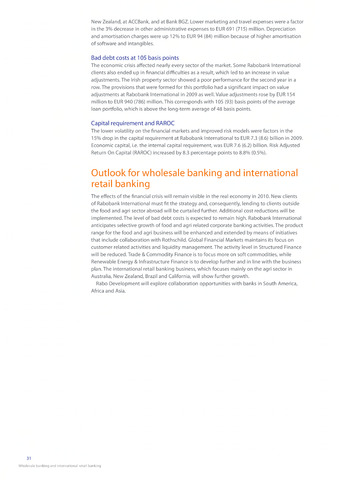Outlook for wholesale banking and international
retail banking
New Zealand, at ACCBank, and at Bank BGZ. Lower marketing and travel expenses were a factor
in the 3% decrease in other administrative expenses to EUR 691 (715) million. Depreciation
and amortisation charges were up 12% to EUR 94 (84) million because of higher amortisation
of software and intangibles.
Bad debt costs at 105 basis points
The economic crisis affected nearly every sector of the market. Some Rabobank International
clients also ended up in financial difficulties as a result, which led to an increase in value
adjustments. The Irish property sector showed a poor performance for the second year in a
row. The provisions that were formed for this portfolio had a significant impact on value
adjustments at Rabobank International in 2009 as well. Value adjustments rose by EUR 154
million to EUR 940 (786) million. This corresponds with 105 (93) basis points of the average
loan portfolio, which is above the long-term average of 48 basis points.
Capital requirement and RAROC
The lower volatility on the financial markets and improved risk models were factors in the
15% drop in the capital requirement at Rabobank International to EUR 7.3 (8.6) billion in 2009.
Economic capital, i.e. the internal capital requirement, was EUR 7.6 (6.2) billion. Risk Adjusted
Return On Capital (RAROC) increased by 8.3 percentage points to 8.8% (0.5%).
The effects of the financial crisis will remain visible in the real economy in 2010. New clients
of Rabobank International must fit the strategy and, consequently, lending to clients outside
the food and agri sector abroad will be curtailed further. Additional cost reductions will be
implemented.The level of bad debt costs is expected to remain high. Rabobank International
anticipates selective growth of food and agri related corporate banking activities. The product
range for the food and agri business will be enhanced and extended by means of initiatives
that include collaboration with Rothschild. Global Financial Markets maintains its focus on
customer related activities and liquidity management. The activity level in Structured Finance
will be reduced. Trade Commodity Finance is to focus more on soft commodities, while
Renewable Energy Infrastructure Finance is to develop further and in line with the business
plan. The international retail banking business, which focuses mainly on the agri sector in
Australia, New Zealand, Brazil and California, will show further growth.
Rabo Development will explore collaboration opportunities with banks in South America,
Africa and Asia.
31
Wholesale banking and international retail banking

